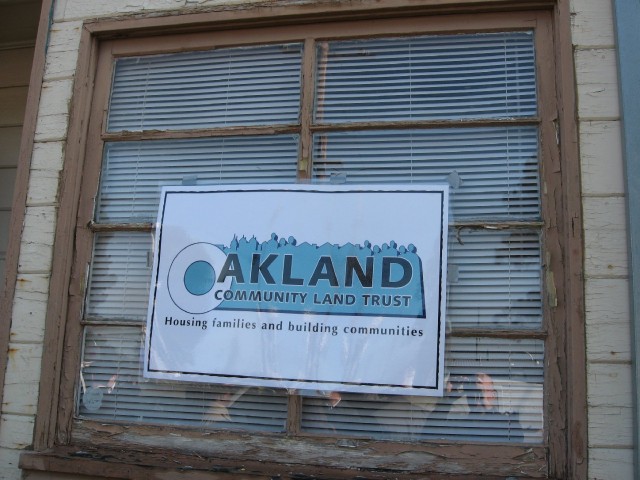
By Tanya Dennis, The Oakland Post (cross-posted with Oakland Local)
Concerned housing activists are meeting with the city about how to revive a stalled community land trust designed to create hundreds of affordable houses in Oakland.
Created with great fanfare in 2009, the Oakland Community Land Trust (OakCLT) was formed by the Urban Strategies Council and other Oakland community-based organizations to provide affordable housing in Oakland.
OakCLT was awarded $5.025 million in Neighborhood Stabilization Program (NSP) funding from Oakland. By acquiring and rehabilitating vacant foreclosed homes, the program was designed help stabilize struggling Oakland neighborhoods and provide affordable homes.
OakCLT acquired its first bank-owned foreclosure on Olive Street in 2010 and officially launched its Neighborhood Stabilization Program Homeownership Project.
Of the 17 foreclosed homes that OakCLT purchased, five have already been sold and another five have been rehabilitated, and the process of finding qualified buyers is underway.
However, analysts estimate that the program must expand to 200 homes to reach the break-even point to be self-sustaining.
But the program has stalled since interim Executive Director Anne Griffith resigned and the defunded Oakland Redevelopment no longer exists to serve as a platform for first-time homebuyers.
These problems have resulted HUD reviewing the city’s administration of the trust.
Concerned that speculators continue to dominate Oakland’s housing market, members of Alliance of Californians for Community Empowerment (ACCE) met recently with Assistant City Administrator Fred Blackwell and Housing Director Michele Byrd to discuss how OakCLT can be revived.
ACCE wants to know why the revolving account was not being utilized to purchase more homes and how the Oakland Housing Counseling “ROOTS” program can be better utilized to find qualified buyers.
Byrd acknowledged that the project had stalled with the loss of the board director and the failure to sell homes to qualified buyers, which has resulted in blight issues.
“After four years the program is working more smoothly. We’re getting more banks on board, and HUD is off our backs,” said Byrd.
“With the market coming back, we anticipate more qualified buyers. However, we still need an administrator for the program. Until that happens, we can’t move effectively move forward.”
Faced with the difficulty in reaching OakCLT’s goal of acquiring 200 homes in order to make the program self-sustaining, Byrd said that there would need to be more tours, perhaps by joining with Operation Hope to do more financial counseling.
Acknowledging that the initial $5 million grant was not enough to acquire 200 homes, she said, “We are reaching out to banks to donate properties to us….Also with improvement in the economy, we’re hopeful that we’ll find more qualified buyers.”
OakCLT has two additional homes in the process of entering the land trust through a partnership with Youth Employment Partnership (YEP), which is rehabilitating the houses as training opportunities for at-risk youth.
OakCLT hopes to expand this strategy to bring more permanently affordable homes to Oakland residents while creating career pathways for young adults.
“At a time when Oakland’s flatland neighborhoods are being bought up by investment firms and hedge funds, the land trust is a countervailing tool supporting community ownership and stewardship of homes and land for the benefit of Oakland’s low- and moderate-income residents,” said Steve King of the Urban Strategies Council.
OakCLT anticipates selling all of its existing homes by the end of 2013.
Note: The original story has been corrected to reflect OakCLT’s founding in 2009, HUD’s review of Oakland’s administration of OakCLT, and a misquote about the Bank of America.
